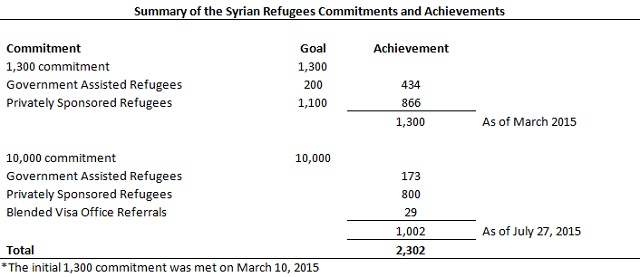WATCH ABOVE: Clarifying his election promise to accept more refugees from Iraq and Syria, PM Stephen Harper went on to explain that the only real solution is to stop ISIS.

CLARIFICATION: This post has been updated to clarify that Harper announced the resettlement of 10,000 Iraqi and Syrian refugees, in addition to previous government commitments, if the Conservatives are re-elected. This updated post also notes a commitment to accept 20,000 Iraqi refugees was met in early 2015 and another 3,000 refugees were added to the commitment.
Canada will welcome another 10,000 refugees fleeing ISIS and the Syrian civil war, Conservative leader Stephen Harper announced during a campaign stop in Toronto on Monday.
The number may sound familiar: The federal government made that commitment in January to resettle 10,000 Syrian refugees in Canada over the next three years, and it was reiterated again by Citizenship and Immigration Minister Chris Alexander in March.
But, Harper’s announcement of a new four-year plan would see an additional 10,000 refugees from persecuted religious minorities in Iraq and Syria – if the Conservatives are re-elected.
Harper also wanted to set the record straight Monday regarding the number of Syrian refugees Canada has already resettled.
“Canada has settled roughly 20,000 Iraqi refugees and now close to 2,500 Syrian refugees,” he said.
Those figures are accurate. But they can be misleading: The 20,000 figure is the total number of Iraqi refugees resettled in Canada since 2009, when Ottawa committed to bringing that many Iraqi refugees to Canada by the end of 2015. After the government said it met that commitment in January, it committed to resettling a further 3,000 Iraqi refugees by the end of this year.

Get daily National news
At this point, Canada has resettled 21,956 Iraqi refugees – 10,287 government assisted and 11,669 privately sponsored – as of July 6.

Those 2,500 Syrian refugees are actually about 2,302 resettled in Canada since 2013 – approximately 0.05 per cent of the more than 4 million Syrians who have fled the country’s bloody civil war and the threat of ISIS. The number includes the 1,300 refugees settled as of March of this year, fulfilling a commitment made in 2013 – but a few months after the original end of 2014 deadline. Roughly 1,000 more Syrians have been resettled, inching towards the 10,000 refugees committed to be resettled by the end of 2017.

READ MORE: Reality check: Does Canada need a law banning travel to terror hotbeds?
Most of the Syrian refugees Canada has accepted – about 1,600 – were privately sponsored. That means private groups, not the government, undertook the paperwork and funding to bring them.
And many of these cases have been in the works for years, said Loly Rico, the co-director of the FCJ Refugee Centre in Toronto.
“They are playing with the numbers,” she said.
Rico is also concerned that the burden for filling that 10,000-refugee promise will be placed on the sponsors. It’s no easy feat for private groups to sponsor refugees and raise the money to bring them here.
READ MORE: Jordan camp for Syria refugees now its own city as civil war grinds on
Lifeline Syria is trying to rally enough private sponsors to bring 1,000 Syrian refugees to the Greater Toronto Area over the next two years.
“It takes a long time to get groups together. It takes a long time to do the paperwork,” said Alexandra Kotyk, Lifeline Syria’s project manager.
Some of the privately sponsored refugees may be referred via the Canadian government, but many of the people Lifeline Syria works with are identified by family members or friends already living here.
Sponsoring groups also have to prove the refugees need resettlement and prove they have the money to “take on the liability for the family,” Kotyk said. For a family of four that amounts to about $27,000. Then the case goes to a visa officer overseas who decides whether to accept the family.
More than 4 million people have fled Syria, many of them living in overflowing refugee camps in neighbouring countries. An estimated 7.6 million more are internally displaced in the war-ravaged country.
Those desperate civilians are contributing to the worst refugee crisis since the Second World War, with nearly 60 million people displaced worldwide. At least 2,000 people have died trying to cross the Mediterranean, en route to Europe, so far this year.








Comments
Want to discuss? Please read our Commenting Policy first.